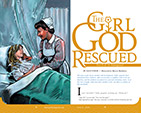I can’t breathe!” Sally gasped,
waking up. “Help me!”
“Stay still,” a voice said. “You
must be quiet.”
Sally opened her eyes. She saw a
woman in a white uniform hovering over her. Clear plastic sheeting covered the
upper part of her bed, forming a tent around her. Droplets of water hung from
the sides.
“This is an oxygen tent,” the woman
said. “I’m Carol, your nurse. “The oxygen will help you breathe. Try to sleep.”
Hours later Sally awoke. She felt
like an elephant sat on her chest.
“She isn’t getting enough oxygen in
spite of the tent,” Sally heard a doctor say to Carol. “I’m starting an
intravenous medication right now.”
Sally felt so weak she didn’t
resist when the doctor plunged the needle into her arm. He taped it down and
connected the tube to a large bottle with yellow fluid in it.
“Keep a close eye on her,” he said.
“Call me if there is any change. I’d like to save this girl, but I don’t see
how I can.”
Day after day doctors and nurses
came and went. They poked her with needles, took X-rays, and tried different
medicines. Still she struggled to breathe.
One day Sally sat up. She strained
to draw air into her lungs and push it out again. Suddenly she didn’t feel like
struggling any longer. She fell back onto the bed and closed her eyes, feeling
relaxed, almost good. I’m dying, she thought.
A clatter of metal and jumble of
loud voices jarred her. She opened her eyes and looked through the open door
into the hall. A doctor reached into his pocket and grabbed a penknife. When he
opened the knife, a bit of sunlight reflected off the steel blade.
The doctor ran into Sally’s room,
pointing the knife at her. He reached out and pulled her head back and plunged
the blade into her throat. Sally felt fluid blast from her throat. Suddenly her
lungs drew in a great breath of air. Sweet air flowed in and out. The doctor
pushed her bed out of the room and down the hall. They entered a room marked
“Surgery.” Before she could ask any questions, she blacked out.
The next day Sally awoke and saw
that a thin hose connected her to a great machine that sat beside her bed. It
wheezed and clattered, pushing air into her lungs and pulling it out. Red and
blue lights flashed on and off. She passed in and out of consciousness while
nurses came into the room to check on her. Worry lines creased their faces. She
watched the activity around her. No one spoke to her. It means they think I
will die, she thought.
One morning the door opened, and a
tall woman in a white uniform, wearing a cap on her head, marched into the
room. “I’m Laura,” she announced. “I’m here to help you get well, Sally.”
She knows my name, Sally thought.
She thinks I can get well. How can that be? I can’t eat or move or even breathe
on my own.
Laura placed a black book on the
desk, then busied herself about the room, checking the IV bottle and the
numbers on the machine. She explained everything. “This ventilator pushes good
air into your lungs until you can breathe on your own.”
Sally tried to stay awake and
listen to all the explanations. She liked the way Laura talked to her, but
Sally couldn’t respond. It’s because I have a tube in my throat, she thought.
Each day she discovered that a bit more strength crept into her body.
One morning a man came into the
room and attached a mirror to the head of the bed. Laura adjusted it so she
could see Sally from her nearby desk. That afternoon Sally watched Laura
reading a black book. Her face brightened. She sure looks happy, Sally thought.
I wonder what she’s reading.
Laura got up from the desk and
started to check the ventilator and other equipment. Sally stared at the open
book in the mirror. She struggled to read a word at the top of the page. The
letters marched in reverse: H-A-I-M-E-R-E-J. Then Sally transposed the letters
in her mind: J-E-R-E-M-I-A-H.
It’s a Bible, she thought. Sally
struggled to read the next three lines, one word at a time. She felt exhausted
after only a few minutes, but she gradually put the words together. They formed
three short sentences.
“‘I know the plans I have for you,’
declares the Lord, ‘plans to prosper you and not to harm you, plans to give you
hope and a future.’”*
God gave Jeremiah these words. He’s
trying to tell me that He has plans for me, Sally thought. The idea made her
smile.
The next day Laura gave Sally a
bath and braided her hair. She put a little pink bed jacket on her. “Someone is
coming to visit you this morning,” she said.
“Who is coming?” Sally asked
silently, forming the words with her lips. I wish it could be Mother, she
thought. I wonder why she hasn’t come for me.
“Hello,” Laura said, answering a
knock on the door. A woman walked in.
“Mother!” Sally gasped, trying to
sit up and talk.
Mother reached out and took Sally
in her arms. She cried. Suddenly a warning light on the ventilator began to
flash red. Laura reached out and touched Sally’s shoulder. “You must calm
yourself,” she said.
Mother laid Sally back onto the
pillow. “Quiet, Sally. It’s OK,” she whispered.
Sally tried to relax, and her
heartbeat slowed. Mother drew up a chair and held Sally’s hand. She couldn’t
stop the tears that streamed down her cheeks.
“These are tears of joy, Sally. I
came as soon as the doctors felt you could handle a visit.”
“We’re already working to wean her
off the ventilator,” Laura explained. “And we think she’ll be able to breathe
on her own soon.”
“You’re making good progress,
dear,” Mother said. “I’ve been praying for you. I have to go now, but I’ll see
you as soon as I am allowed to return.” She bent down and kissed Sally on the
forehead.
Sally sighed and closed her eyes.
When she opened them again, it was morning. Day after day, strength and hope
poured into Sally. One afternoon the doctor removed the tube in her throat. He
stood beside the bed watching to see if Sally could breathe without the
ventilator. Sally took a few short, shallow breaths. Then she took some
regular, deep breaths.
“Remove the ventilator,” the doctor
ordered, smiling.
Sally knew she wasn’t ready for a
jump rope, but she didn’t feel weak or dizzy when she moved around in the bed.
Laura taught her to speak by pressing her hand over the bandage on her neck.
“Thank you,” Sally said.
They were her first words spoken
aloud in many weeks. Laura threw her head back and laughed. Two weeks later,
when Laura came into the room, she smiled and announced, “You’re ready to go
home.”
“Home?” Sally questioned. Where is
my home? she wondered.
*Jeremiah 29:11


